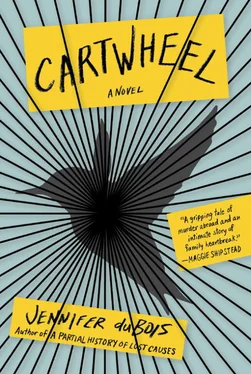“And when did the knife come in?” Eduardo said this dispassionately. One could not let emotion corrode these things. He had to think of what it would be like to lose Maria. He had to believe that somebody—somebody rational and humane—would go about the careful business of doing all of this when he was unable to; he had to believe that somebody would stand back from the mosaic and try to make sense of the whole.
“I honestly don’t even know,” said Toledo. “I was really drunk and frankly pretty high. Maybe Lily grabbed it, or maybe I did. Or maybe even Katy did. I mean, I’m sure your tests will show what happened, but I honestly don’t know. It was a mess. And in what seemed like a minute Katy was on the ground, and it seemed like she was hurt pretty bad. I asked Lily if maybe we needed to take her to the hospital but Lily said no, it was her problem, she would take care of it and would keep an eye on her and would call for help if she needed it. So anyway, naturally I left then. I definitely didn’t think Katy was dead at the time. It never would have occurred to me that she could be. I thought she was like, passed out. Every night at Fuego some girl or five passes out. I didn’t know that Katy had died until I saw it on TV the next day. And I had no idea what the hell had happened, or what had happened after I left, so I figured it was best to just lie low and see what happened next.” He shook his head. “It’s horrible. It’s absolutely horrible. I really can’t believe it at all.”
“Thank you,” said Eduardo. “I do appreciate your being so forthcoming.”
Toledo shook his head. “I just wish I’d known what Lily was really like, you know?” he said. “Then maybe I could have stopped it.”
That day, Eduardo left work early. Outside, the evening was balmy, the light still dripping off the buildings like icicles. He had decided he would walk home.
Eduardo was, overall, very satisfied with Toledo’s confession. In a broad sense, of course, no murder confession could ever be truly satisfying, because you could not hope for a real answer to the fundamental question of why one person murdered another. That question was on the order of cosmic questions about meaning and love and mortality, and it was not the job of a newspaper or a court to unravel it. In most cases—and this case, it seemed, was no different—there was no answer that could ever make a normal person understand.
Across the street from Eduardo, a small protest was beginning. The students were yelling Putos Peronistas! this year, but they were yelling something every year. Eduardo stopped for a moment and marveled. All that vanity and self-congratulation, and all for not being dead or old yet. As though this, in and of itself, was some kind of accomplishment. Eduardo kept walking.
But even without a satisfying answer to that most elemental question—the question of why—Toledo’s story made sense. The story did not need to force a jurist or a prosecutor or an average person to empathize his way into comprehension, after all. It did not need to make them see how an event like this could happen; it needed only to convince them that it had. And on that score, the confession worked. Significantly, it drew a narrative line between the triplicate data points of Lily’s DNA: on the knife, on Katy’s mouth, and on the bra. The defense could tell a heroic story about CPR to explain the mouth, but that story would not explain the bra, and Ignacio Toledo’s story explained both. It further explained the hours between when Katy Kellers died, according to the pathologist, and when Lily Hayes was seen streaking across the yard with blood on her face: If she and Toledo had not realized that Katy was mortally wounded, then Lily probably was surprised to find her dead. And all of this fit with the fact that clearly neither Lily nor Ignacio Toledo had expected the night to turn out the way it had; even before it was tested, the visible presence of DNA at the crime scene had strongly suggested that Katy’s murder had not been premeditated—had perhaps not even been entirely intentional.
Toledo’s story made sense of all of this, too. And more important still, from the panelists’ perspective, it was unlikely that Toledo could know that it did. Realizing that Toledo had an incentive to lie about Lily’s involvement was one thing, after all—believing that he’d had the foresight to craft such a comprehensive, multivariable lie was quite another. And most crucially, perhaps, Toledo’s story was really only a continuation of the stories the judge panelists would have already heard from Lily herself: her suspicions about Sebastien and Katy leading to the fight with Katy at Fuego leading to Lily’s firing leading, finally, to this. The alcohol, the proximity to drugs, made more explicable the gulf between Lily’s past behavior and her behavior on this night. And although it would have been better if Ignacio Toledo and Lily had been seen together, they had both independently supplied reasons why they might have tried hard not to be: Toledo wanted to keep Lily out of sight of Javier Aguirre; and Lily had, by her own belated admission, purchased illegal drugs from Toledo—which must have seemed like a pretty serious problem, before Lily learned just how serious problems could be.
It was true, of course, that Eduardo did not need Lily any longer to successfully prosecute the case. He had Ignacio Toledo—both his story and his DNA—and there were prosecutors, Eduardo knew, who would now begin to see Lily Hayes as a murky distraction, a person whose guilt was quickly becoming inconvenient. There were prosecutors who would want to edit her out of the narrative in order to tell the jurist panelists a cleaner, less subtle story—a story in which all the victims and villains looked the way they usually did, and all the motives were fairy-tale clear—and, depending on how much they thought it would strengthen the state’s overall case, there were prosecutors who might even offer Ignacio Toledo a modest deal in exchange for excising Lily from his confession. A deal of that sort could be breathtakingly, vanishingly modest—since Ignacio Toledo had absolutely nothing to lose—and there were prosecutors who would see all of this as an overarching win: one small moral concession for a broader moral victory, an indisputably pragmatic trade-off. There were prosecutors who would shrug and send Lily off into her life, keeping her guilt a secret between them. They would console themselves with the thought that she was very unlikely to do anything violent ever again. And they would tell themselves that—either way—the prosecution of Lily Hayes, as that of all people everywhere, was ultimately in the hands of God.
But Eduardo could do none of this. He had heard a line once that had stayed with him, both for its elegance and its wrongness: It is the final proof of God’s omnipotence that He need not exist in order to save us . Where had Eduardo heard that quote? He did not know, but he knew he did not believe it. The way to assure morality on Earth was not to behave as though there was a God, even if there wasn’t—it was to behave as though there was no God, even if there was. We must act as though ours is all the judgment and forgiveness that is ever forthcoming, if we want any hope of getting anything right. Maria was a living reminder of that charter, if Eduardo could have ever forgotten it. Human love meant the witness of human lives, and Maria was witnessing Eduardo’s, even if no one else was. And dropping Lily’s prosecution would be a rejection of the single mission that was, whether divinely charged or not, the only mission men are tasked with. In the end, it would be an act of moral violence done not only to Katy Kellers, but to Lily Hayes, as well, and even, in a small way, to Eduardo himself: It would be a denial of all of their humanity. The difference, really, was only a matter of degree.
Читать дальше












